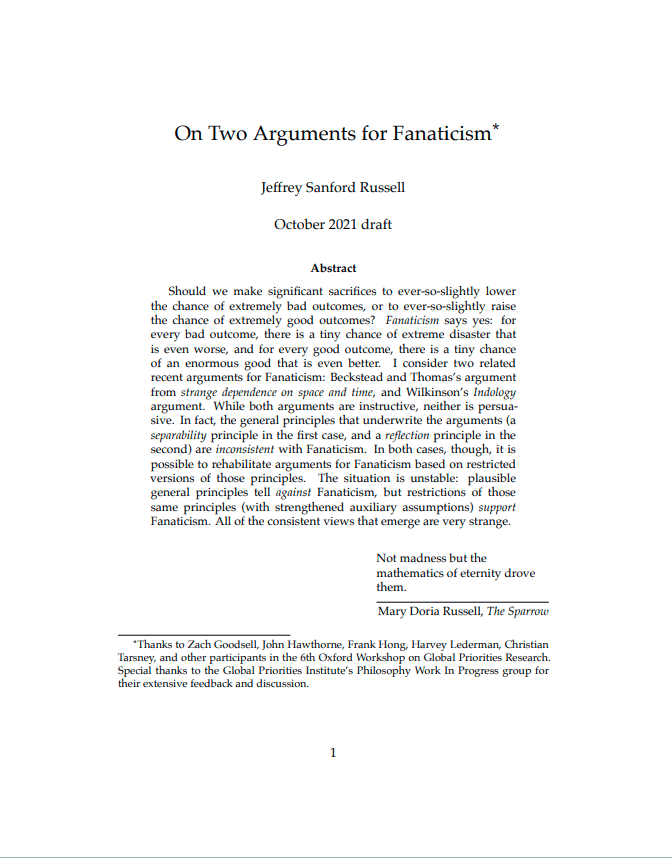On two arguments for Fanaticism
Jeffrey Sanford Russell (University of Southern California)
GPI Working Paper No. 17-2021, published in Noûs
Should we make significant sacrifices to ever-so-slightly lower the chance of extremely bad outcomes, or to ever-so-slightly raise the chance of extremely good outcomes? Fanaticism says yes: for every bad outcome, there is a tiny chance of extreme disaster that is even worse, and for every good outcome, there is a tiny chance of an enormous good that is even better. I consider two related recent arguments for Fanaticism: Beckstead and Thomas’s argument from strange dependence on space and time, and Wilkinson’s Indology argument. While both arguments are instructive, neither is persuasive. In fact, the general principles that underwrite the arguments (a separability principle in the first case, and a reflection principle in the second) are inconsistent with Fanaticism. In both cases, though, it is possible to rehabilitate arguments for Fanaticism based on restricted versions of those principles. The situation is unstable: plausible general principles tell against Fanaticism, but restrictions of those same principles (with strengthened auxiliary assumptions) support Fanaticism. All of the consistent views that emerge are very strange.
Other working papers
The cross-sectional implications of the social discount rate – Maya Eden (Brandeis University)
How should policy discount future returns? The standard approach to this normative question is to ask how much society should care about future generations relative to people alive today. This paper establishes an alternative approach, based on the social desirability of redistributing from the current old to the current young. …
Quadratic Funding with Incomplete Information – Luis M. V. Freitas (Global Priorities Institute, University of Oxford) and Wilfredo L. Maldonado (University of Sao Paulo)
Quadratic funding is a public good provision mechanism that satisfies desirable theoretical properties, such as efficiency under complete information, and has been gaining popularity in practical applications. We evaluate this mechanism in a setting of incomplete information regarding individual preferences, and show that this result only holds under knife-edge conditions. We also estimate the inefficiency of the mechanism in a variety of settings and show, in particular, that inefficiency increases…
Moral demands and the far future – Andreas Mogensen (Global Priorities Institute, Oxford University)
I argue that moral philosophers have either misunderstood the problem of moral demandingness or at least failed to recognize important dimensions of the problem that undermine many standard assumptions. It has been assumed that utilitarianism concretely directs us to maximize welfare within a generation by transferring resources to people currently living in extreme poverty. In fact, utilitarianism seems to imply that any obligation to help people who are currently badly off is trumped by obligations to undertake actions targeted at improving the value…

